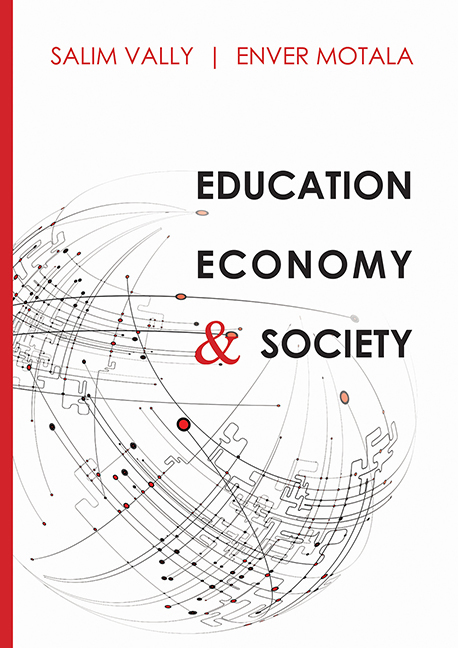Book contents
- Frontmatter
- Contents
- Foreword
- Preface
- About the contributors
- Acknowledgements
- Abbreviations and acronyms
- Chapter 1 ‘NO ONE TO BLAME BUT THEMSELVES’: Rethinking the Relationship between Education, Skills and Employment
- Chapter 2 EDUCATION AND ECONOMY: Demystifying the Skills Discourse
- Chapter 3 UNIVERSITIES AND THE ‘KNOWLEDGE ECONOMY’
- Chapter 4 GOING AROUND IN CIRCLES: Employability, Responsiveness, and the Reform of the College Sector
- Chapter 5 BUILDING A TRANSFORMATIVE PEDAGOGY in Vocational Education
- Chapter 6 SKILLS? WHAT SKILLS? JOBS? WHAT JOBS? An Overview of Research into Education/Labour Market Relationships
- Chapter 7 DEBATING THE NEXUS of Education, Skills and Technology in the Age of Lean Production: A Case Study of the ArcelorMittal Vanderbijlpark Plant
- Chapter 8 SKILLS, JOBS AND DECEPTION: Examples from the South African Workplace
- Chapter 9 ON THE USE AND ABUSE OF EDUCATION: Reflections on Unemployment, the ‘Skills Gap’ and ‘Zombie Economics’
- Chapter 10 THE YOUTH WAGE SUBSIDY in South Africa: Employment, Skills and ‘Churning’
- Chapter 11 EPISTEMIC INJUSTICE and the Struggle for Recognition: Human Dignity and the Recognition of Prior Learning
- Chapter 12 (RE)CLAIMING WORKERS' EDUCATION
- Chapter 13 SKILLS DEVELOPMENT in Post-Apartheid South Africa: Issues, Arguments and Contestations
- Index
Chapter 4 - GOING AROUND IN CIRCLES: Employability, Responsiveness, and the Reform of the College Sector
Published online by Cambridge University Press: 16 February 2020
- Frontmatter
- Contents
- Foreword
- Preface
- About the contributors
- Acknowledgements
- Abbreviations and acronyms
- Chapter 1 ‘NO ONE TO BLAME BUT THEMSELVES’: Rethinking the Relationship between Education, Skills and Employment
- Chapter 2 EDUCATION AND ECONOMY: Demystifying the Skills Discourse
- Chapter 3 UNIVERSITIES AND THE ‘KNOWLEDGE ECONOMY’
- Chapter 4 GOING AROUND IN CIRCLES: Employability, Responsiveness, and the Reform of the College Sector
- Chapter 5 BUILDING A TRANSFORMATIVE PEDAGOGY in Vocational Education
- Chapter 6 SKILLS? WHAT SKILLS? JOBS? WHAT JOBS? An Overview of Research into Education/Labour Market Relationships
- Chapter 7 DEBATING THE NEXUS of Education, Skills and Technology in the Age of Lean Production: A Case Study of the ArcelorMittal Vanderbijlpark Plant
- Chapter 8 SKILLS, JOBS AND DECEPTION: Examples from the South African Workplace
- Chapter 9 ON THE USE AND ABUSE OF EDUCATION: Reflections on Unemployment, the ‘Skills Gap’ and ‘Zombie Economics’
- Chapter 10 THE YOUTH WAGE SUBSIDY in South Africa: Employment, Skills and ‘Churning’
- Chapter 11 EPISTEMIC INJUSTICE and the Struggle for Recognition: Human Dignity and the Recognition of Prior Learning
- Chapter 12 (RE)CLAIMING WORKERS' EDUCATION
- Chapter 13 SKILLS DEVELOPMENT in Post-Apartheid South Africa: Issues, Arguments and Contestations
- Index
Summary
Introduction
Scarcely a day goes by in South Africa without a statement by a senior political leader or official focusing on the need to strengthen South Africa's education system, and more often than not there is mention of the central role of skills development and Vocational Education and Training (VET). Education is seen as central to the ‘fight’ against poverty and unemployment. In a speech at the University of Witwatersrand the Deputy President, Kgalema Motlanthe (BuaNews 2013), made the following statement:
Economic productivity is the fruit of long-term investment in the national education system. Short of an education system geared to the particular developmental needs of the country, we will be hard put breaking into highlevel economic productivity that can extricate us from the inter-generational cycle of poverty.
This faith in the investment in human capital as a means for addressing South Africa's economic and social challenges is widespread, not only in government but also in wider society. Inevitably, South Africa's Further Education and Training (FET) colleges (soon to be renamed Technical and Vocational Education and Training (TVET) Colleges) are mentioned as part of the solution.
A recently published survey once again highlighted the acute crisis South Africa faces with respect to unemployment: 28% of South Africans are unemployed and looking for work with only thirty eight per cent employed either full-time or part time (IPSOS 2013). The authors of the report note that in all surveys conducted since 1994, the year the first democratic elections were held, ‘unemployment and the slow process of job creation are mentioned as some of the biggest problems in South Africa’ (ibid:1). The fact that after almost twenty years of democracy there is still such a high unemployment rate is a major political and social challenge that remains top of the government's stated agenda. Since a significant proportion of the unemployed are under the age of 25 poses an additional risk, as these young people comprise the ‘new dangerous class’ (Standing 2010). Various estimates suggest that there are as many as 3.5 million people who are not in employment, education or training – the so-called not in education, employment or training ([NEET], Cloete 2011).
- Type
- Chapter
- Information
- Education, Economy & Society , pp. 57 - 80Publisher: University of South AfricaPrint publication year: 2014



